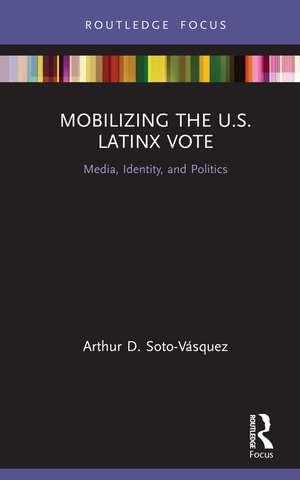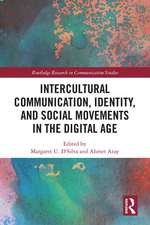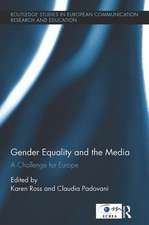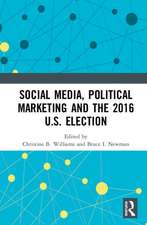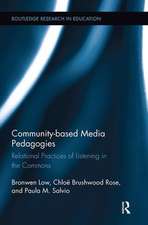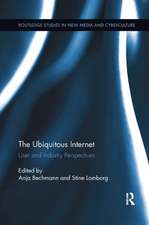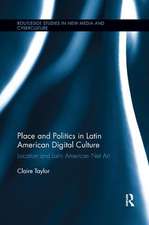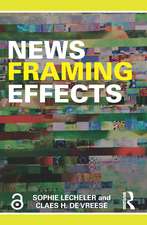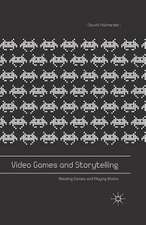Mobilizing the U.S. Latinx Vote: Media, Identity, and Politics: Routledge Focus on Digital Media and Culture
Autor Arthur D. Soto-Vásquezen Limba Engleză Hardback – 4 feb 2020
Utilizing an in-depth study of the mobilizing efforts of national Latinx groups, along with a rigorous analysis of online media, news media, and electoral results, this book discusses:
- How the old notions of white and black America clash with the growing focus on Latinos
- How political organizers develop and use messages of racial solidarity to motivate people, what technologies are at their disposal, and what their use means
- How the study of new media is vital to exploring race in the 21st century, and why communication cannot ignore the racial legacies of the 20th century
Theoretically located in between the fields of communication and racial/ethnic studies, this book will be of great relevance to scholars and students working in the field of communication studies, political communication, Latinx studies, and sociology.
| Toate formatele și edițiile | Preț | Express |
|---|---|---|
| Paperback (1) | 186.49 lei 6-8 săpt. | |
| Taylor & Francis – 30 sep 2021 | 186.49 lei 6-8 săpt. | |
| Hardback (1) | 461.66 lei 6-8 săpt. | |
| Taylor & Francis – 4 feb 2020 | 461.66 lei 6-8 săpt. |
Preț: 461.66 lei
Nou
Puncte Express: 692
Preț estimativ în valută:
88.37€ • 96.02$ • 74.28£
88.37€ • 96.02$ • 74.28£
Carte tipărită la comandă
Livrare economică 21 aprilie-05 mai
Preluare comenzi: 021 569.72.76
Specificații
ISBN-13: 9780367418427
ISBN-10: 0367418428
Pagini: 142
Dimensiuni: 138 x 216 x 15 mm
Greutate: 0.27 kg
Ediția:1
Editura: Taylor & Francis
Colecția Routledge
Seria Routledge Focus on Digital Media and Culture
Locul publicării:Oxford, United Kingdom
ISBN-10: 0367418428
Pagini: 142
Dimensiuni: 138 x 216 x 15 mm
Greutate: 0.27 kg
Ediția:1
Editura: Taylor & Francis
Colecția Routledge
Seria Routledge Focus on Digital Media and Culture
Locul publicării:Oxford, United Kingdom
Public țintă
Postgraduate and UndergraduateCuprins
- Introduction: Dreams of a United Latinx Polity
- Cultural and Political Change Meets Latinxs
- Introducing the Mediation of U.S. Latinx Identity
- Methodology
- Outline of Chapters
- The Mediation of Latinx Identity Before the Internet
- A Note on Terminology
- Contextualizing the Political and Economic Moment
- Racial Formation Theory Applied
- Minimization of Difference
- Denationalization
- Racialization
- New Media and U.S. Latinx Identity
- Naming in a Networked Society
- The "New Latino" and Online Expression
- Navigating American Democracy Online as a Latinx
- Political Mobilization in the Post-Modern Digital Era
- Digital Politics—Tools, Opportunities, and Vulnerabilities
- Campaigns and Political Advertising Online
- Voters as Audience-identity Constructions
- Post-modern Identity and Politics
- Towards a "New Latino" Hybrid
- The Professional Political Class of U.S. Latinxs
- Minimization of Difference
- Denationalization
- Racialization
- Other Emergent Themes
- Latinx Presentation, Digital Representation
- Platforms and Messages
- The End of DACA
- The Shutdown
- The 2018 Texas Democratic Primary
- New Tools, Old Practices?
- Media Coverage of the 2018 Midterms
- How the Media Talked About Latinx Voters
- Minimization of Difference
- Denationalization
- Racialization
- Telling the Latinx Story
- Conclusion
- Findings Summarized
- Contributions Summarized
- Limitations of Study
- Recommendations
Notă biografică
Arthur D. Soto-Vásquez, PhD, is an Assistant Professor of Communication at Texas A&M International University. He studies the relationship between digital media, popular culture, and identity making. He has previously published award-winning research on digital privacy in U.S. presidential campaigns and on presidential rhetoric regarding Latinxs in the United States. He is from El Paso, Texas
Descriere
This book examines the politics involved in the mobilization of the Latinx vote in America. Delving into the questions of race and identity formation in conjunction with the role of communication media, the author discusses the implications for Latinx voters and their place in the American political and racial system.
